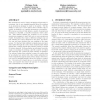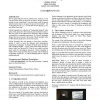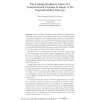145 search results - page 29 / 29 » Adversarial learning |
113
click to vote
WPES
2003
ACM
15 years 7 months ago
2003
ACM
Mix networks are used to deliver messages anonymously to recipients, but do not straightforwardly allow the recipient of an anonymous message to reply to its sender. Yet the abili...
115
click to vote
ACMACE
2009
ACM
15 years 7 months ago
2009
ACM
How do games effect the way we problem solve, socialize, or even view the world? When we shoot do we learn to destroy obstacles instead of work around them? Does the binary world ...
140
click to vote
ACL
2003
15 years 4 months ago
2003
Many applications of natural language processing technologies involve analyzing texts that concern the psychological states and processes of people, including their beliefs, goals...
149
Voted
ASIACRYPT
2011
Springer
14 years 2 months ago
2011
Springer
A cryptographic assumption is the (unproven) mathematical statement that a certain computational problem (e.g. factoring integers) is computationally hard. The leakage-resilience l...
121
click to vote
CRYPTO
2011
Springer
14 years 2 months ago
2011
Springer
Secure computation enables mutually suspicious parties to compute a joint function of their private inputs while providing strong security guarantees. Amongst other things, even i...



